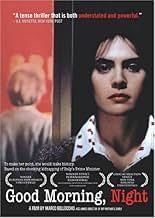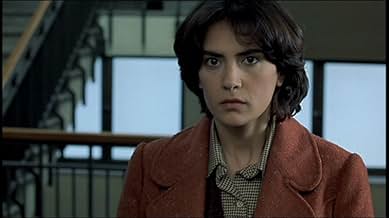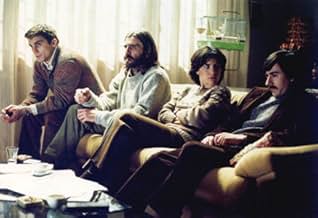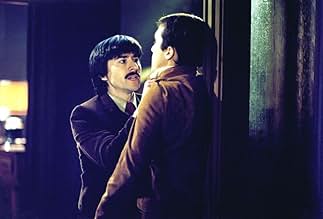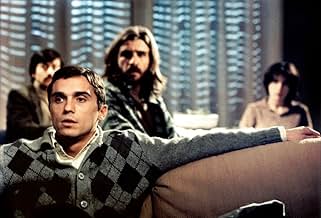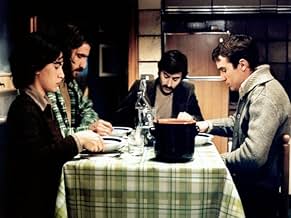IMDb RATING
7.1/10
4.2K
YOUR RATING
The 1978 kidnapping of politician Aldo Moro as seen from the perspective of one of his assailants: a conflicted young woman in the ranks of the Red Brigade.The 1978 kidnapping of politician Aldo Moro as seen from the perspective of one of his assailants: a conflicted young woman in the ranks of the Red Brigade.The 1978 kidnapping of politician Aldo Moro as seen from the perspective of one of his assailants: a conflicted young woman in the ranks of the Red Brigade.
- Awards
- 13 wins & 21 nominations total
Giulio Bosetti
- Paolo VI
- (as Giulio Stefano Bosetti)
7.14.2K
1
2
3
4
5
6
7
8
9
10
Featured reviews
beautiful minor movie on a major event of the Italian history
Aldo Moro's kidnapping and murder was at its time a huge event for the Italian history and the world. With the recrudescence of terrorism at the beginning of the 70s, some of the extreme left movements in Europe - especially in Germany and Italy - embraced the path of the 'armed struggle', a deformation of the Marxist concept of class struggle in a try to stop the historical reconciliation between the traditional political parties and an Italian Comminist Party already feeling the winds of reform that will melt down the Iron Curtain 10-15 years later.
Marco Bellocchio's film tackles the story from the perspective of the day to day life of the kidnappers, and through the eyes and dreams of one of the kidnappers - the only female in the group. We do not see any of the bloody events of the kidnapping or the outcome, and most of the action happens in the rented flat where the captors kept Moro imprisoned. The director and the splendid main actress Maya Sansa succeed to re-create the political conditioning and the motivations that brought the young woman to join the terrorist fighting path, but also the human dimension that brings her back the feelings of compassion to the victim. It is Aldo Moro's portrait played by Roberto Herlitzka which seems surprinsigly more sketchy, and I had the feeling that a greater message about the relationship between kidnapper and victim was missed.
It is still an interesting movie to watch, minor in style but human, dealing from a different perspective with a theme that too often generated films that were spectacular, but deprived of any true emotion. 8 out of 10 on my personal scale.
Marco Bellocchio's film tackles the story from the perspective of the day to day life of the kidnappers, and through the eyes and dreams of one of the kidnappers - the only female in the group. We do not see any of the bloody events of the kidnapping or the outcome, and most of the action happens in the rented flat where the captors kept Moro imprisoned. The director and the splendid main actress Maya Sansa succeed to re-create the political conditioning and the motivations that brought the young woman to join the terrorist fighting path, but also the human dimension that brings her back the feelings of compassion to the victim. It is Aldo Moro's portrait played by Roberto Herlitzka which seems surprinsigly more sketchy, and I had the feeling that a greater message about the relationship between kidnapper and victim was missed.
It is still an interesting movie to watch, minor in style but human, dealing from a different perspective with a theme that too often generated films that were spectacular, but deprived of any true emotion. 8 out of 10 on my personal scale.
Just to clarify
I've read the other comments on this board and I would like to precise that Aldo Moro at the time was not the Italian President and that obviously the Red Brigades were out for his blood because he was working skilfully at a compromise between the Christian Democrats and the Communists and that meant for the extremists of the left to be cut out from any kind of power or hold they might have on the Government. The film itself does not seek to give political answers and is much more concerned with the human aspects of the drama. It's more lyrical than realistic... if you're looking for action or for a docudrama, you should probably go elsewhere.
Intriguing Effort to Understand Terrorists
"Good Morning, Night (Buongiorno, notte)" is an intriguing effort to understand terrorists.
Loosely based on a novel, writer/director Marco Bellocchio specifically re-imagines the kidnapping of Italian party leader Aldo Moro in 1987, with heavy use of television clips. The quaintly naive Cold War rhetoric, emphasized with odd historic black and white newsreel interstices such as of Stalinist parades, may now be seen as an examination of a symbolic precursor for today's gruesome politics, though he was already working on the film at 9/11.
The young idealists we are first introduced to seem as harmless as the radical pranksters in the contemporary "The Edukators (Die Fetten Jahre sind vorbei)." While it's a jolt to gradually learn their connection to the violent attack, first revealed as they cheer at the initial TV coverage, they seem so bumbling and nervous (one takes leave abruptly for, as it were, a conjugal visit as he feels he's the one being imprisoned; another gets fixated on an overly symbolic pet caged bird), it's never clear if they personally committed murder or if they're just the guardian cell taking orders from those who stage the mock trial and pull the triggers or if that is a moral difference that is intentionally considered irrelevant.
Real world politics do occasionally seep through in silent background commentary, through factory strikes and sarcastic graffiti, but the determined ideologues reject these actions as they see themselves as the true believers. Ironically, the drone of the TV coverage, with reports of related and unrelated violent acts around the country, they anxiously watch becomes as much a recitation as the opening pitch from the bored apartment rental agent.
Their Red Brigade aims seem so diffuse about intending to set off revolutions and counter-revolutions, compared to the more direct motives of the terrorists in "Paradise Now" (let alone how kidnapping has devolved into a business, as in "Secuestro Express"), at least to those not intimately familiar with Italian political dialectics, that it seems more understandable than ludicrous that the negotiations draw on. A long side bar scene where one of the kidnappers joins her family in a memorial service for World War II partisans nostalgically singing an anti-Fascist anthem, inspiring her to read a collection of letters resistance fighters wrote before their executions instead of her usual Lenin or Engels reading, makes the dialectics even more ironic as to what fascist behavior is. Her internal struggle to resolve these pressures, including several confusing dream sequences, is the core of the film and Maya Sansa, with very expressive eyes, is captivating as "Chiara."
The kidnapping itself takes on a "Ransom of Red Chief" feel as the Aldo Moro character, well-played by Roberto Herlitzka and the point of the film's dedication to the auteur's father, is much more of an eloquent, dignified, paternal humanist statesman than a typical politician. The kidnappers seem to be thwarted in provoking political crisis because he will only write personal, non-political notes to his family, particularly his grandson (even if does seem as if he's writing love notes to his mistress rather than to his wife). But his appeal to the pope and the pope's involvement in the negotiations and their aftermath seems as incongruous as an odd séance by political supporters or the kidnappers doing a blessing before eating. Compared to the director's earlier "My Mother's Smile (L'Ora di religione: Il sorriso di mia madre)," religion is only an ancillary issue.
The auteur's voice, as an artist, seems to speak through a somewhat naive and flirtatious friend of "Chiara"s who has written a screenplay about radicals and quotes the Emily Dickinson poem that inspired the title. He argues that the imagination can be a powerful force in influencing people, though of course the authorities misinterpret his involvement.
I saw it with a defective soundtrack, but other than odd musical commentary with bombastic selections from "Aida" and Pink Floyd, the film's strength is faces and looking into the eyes of deluded cogs in the wheel of historical forces, though the best sequence is given away in the trailer.
Loosely based on a novel, writer/director Marco Bellocchio specifically re-imagines the kidnapping of Italian party leader Aldo Moro in 1987, with heavy use of television clips. The quaintly naive Cold War rhetoric, emphasized with odd historic black and white newsreel interstices such as of Stalinist parades, may now be seen as an examination of a symbolic precursor for today's gruesome politics, though he was already working on the film at 9/11.
The young idealists we are first introduced to seem as harmless as the radical pranksters in the contemporary "The Edukators (Die Fetten Jahre sind vorbei)." While it's a jolt to gradually learn their connection to the violent attack, first revealed as they cheer at the initial TV coverage, they seem so bumbling and nervous (one takes leave abruptly for, as it were, a conjugal visit as he feels he's the one being imprisoned; another gets fixated on an overly symbolic pet caged bird), it's never clear if they personally committed murder or if they're just the guardian cell taking orders from those who stage the mock trial and pull the triggers or if that is a moral difference that is intentionally considered irrelevant.
Real world politics do occasionally seep through in silent background commentary, through factory strikes and sarcastic graffiti, but the determined ideologues reject these actions as they see themselves as the true believers. Ironically, the drone of the TV coverage, with reports of related and unrelated violent acts around the country, they anxiously watch becomes as much a recitation as the opening pitch from the bored apartment rental agent.
Their Red Brigade aims seem so diffuse about intending to set off revolutions and counter-revolutions, compared to the more direct motives of the terrorists in "Paradise Now" (let alone how kidnapping has devolved into a business, as in "Secuestro Express"), at least to those not intimately familiar with Italian political dialectics, that it seems more understandable than ludicrous that the negotiations draw on. A long side bar scene where one of the kidnappers joins her family in a memorial service for World War II partisans nostalgically singing an anti-Fascist anthem, inspiring her to read a collection of letters resistance fighters wrote before their executions instead of her usual Lenin or Engels reading, makes the dialectics even more ironic as to what fascist behavior is. Her internal struggle to resolve these pressures, including several confusing dream sequences, is the core of the film and Maya Sansa, with very expressive eyes, is captivating as "Chiara."
The kidnapping itself takes on a "Ransom of Red Chief" feel as the Aldo Moro character, well-played by Roberto Herlitzka and the point of the film's dedication to the auteur's father, is much more of an eloquent, dignified, paternal humanist statesman than a typical politician. The kidnappers seem to be thwarted in provoking political crisis because he will only write personal, non-political notes to his family, particularly his grandson (even if does seem as if he's writing love notes to his mistress rather than to his wife). But his appeal to the pope and the pope's involvement in the negotiations and their aftermath seems as incongruous as an odd séance by political supporters or the kidnappers doing a blessing before eating. Compared to the director's earlier "My Mother's Smile (L'Ora di religione: Il sorriso di mia madre)," religion is only an ancillary issue.
The auteur's voice, as an artist, seems to speak through a somewhat naive and flirtatious friend of "Chiara"s who has written a screenplay about radicals and quotes the Emily Dickinson poem that inspired the title. He argues that the imagination can be a powerful force in influencing people, though of course the authorities misinterpret his involvement.
I saw it with a defective soundtrack, but other than odd musical commentary with bombastic selections from "Aida" and Pink Floyd, the film's strength is faces and looking into the eyes of deluded cogs in the wheel of historical forces, though the best sequence is given away in the trailer.
Good political docu-drama, superb soundtrack
This is a very good docu-drama about a kidnapping and assassination of a former Prime Minister Aldo Moro of Italy in 1978 by the Red Brigades. Pretty much the whole movie takes place in the hideout where they are keeping the politician, trying to negotiate a change in government and even getting the Pope involved. One of the most amazing things about the movie to me, outside of excellent story telling, is the use of Pink Floyd music. There's not too many movies that get the right to use PF music, but this movie does with "Shine on you crazy Diamond" and "The Great Gig in the Sky". Extremely powerful music to establish tone and mood in the movie, and very effective. I thoroughly enjoyed this movie, and the DVD documentary extra is very good too. It gives a great background to the true story, and a good profile of the filmmaker.
a fiction to look back !
Based on a novel, the film describes the situation of Aldo Moro during his captivity. There is more than a meticulous realistic point of view given in this film : it tries to figure thoughts and attitudes of the kidnappers, members of brigate rosse. It explores the contradictions of hidden activists who are desperately trying to justify violent actions by the salvation of proletariat and rise of a social justice. They are seen in their loneliness, especially on the affective, emotional side. The psycho-rigidity of their mind is patent, not only in the sententious talks to their prisoner, in a certain desperate naivety to seek echos of their action in public opinion throughout medias, but also in the way they rule relationships. It's not politically that Moro's character strongly opposes to his kidnappers' characters, but rather in the way he's emotionnaly tied to his family (although being a prisonner, he can write letters), while the others seem alienated facing their own families (Mariano pretends to have cut any link to his son, Chiara tries to avoid familial phone calls and meetings, another member is mad about being away of his girl and suffers to be away from her mind and point of view when he sees her). Together, those members don't look like a family of a new kind. Maybe is it the main limit of Bellochio's movie, not to explore the way such an internal and autistic logical builds inside radical groups. But the movie spots a clearly defined place and time, focusing exclusively on elements linked to Moro's detention in a casual apartment (the gunfight of the kidnapping and then the death of the prisonner are seen indirectly throughout television). The strength of the movie is to develop a symbolic aspect with the character of Chiara's colleague (of her cover work) who defends imagination against the brutality of autocratic arbitrary. Almost fantastically, this character seems to guess Chiara's situation, writing a fiction about the events (like the movie we're effectively seeing as spectators) and modifying her feelings : when she realizes how any execution is horrible and unfair (reminding executions of italian partisani of WWII), it's too late and there is no other escape than in her own imagination (dream-like scene that the film also shows us). I believe it's a good and clever way to introduce us into such a historical event (maybe still wounding italian society), imagination. I also like the aspects and details of the movie that describe the importance of christianity in the conscience of the italians (even marxists ones, subconsciously) and critizises the sacrificial consensus into a falsely ineluctable execution but real murder.
Did you know
- TriviaWas appreciated by the relatives of Aldo Moro.
- GoofsNear the end, when Aldo Moro walks away in the deserted street, you can see a multicolored Peace flag in the background. Those flags would decorate Italian streets only in 2003, to oppose the invasion of Iraq.
- ConnectionsEdited from Paisan (1946)
- SoundtracksMarcia trionfale
(from "Aida")
Composed by Giuseppe Verdi
Performed by Orchestra e Coro del Teatro dell'Opera di Roma
Conducted by Georg Solti
Decca Records, 1962
- How long is Good Morning, Night?Powered by Alexa
Details
- Release date
- Country of origin
- Language
- Also known as
- Buenos días, noche
- Production companies
- See more company credits at IMDbPro
Box office
- Gross US & Canada
- $10,093
- Opening weekend US & Canada
- $2,769
- Nov 13, 2005
- Gross worldwide
- $4,240,918
- Runtime
- 1h 46m(106 min)
- Color
- Sound mix
- Aspect ratio
- 1.66 : 1
Contribute to this page
Suggest an edit or add missing content

